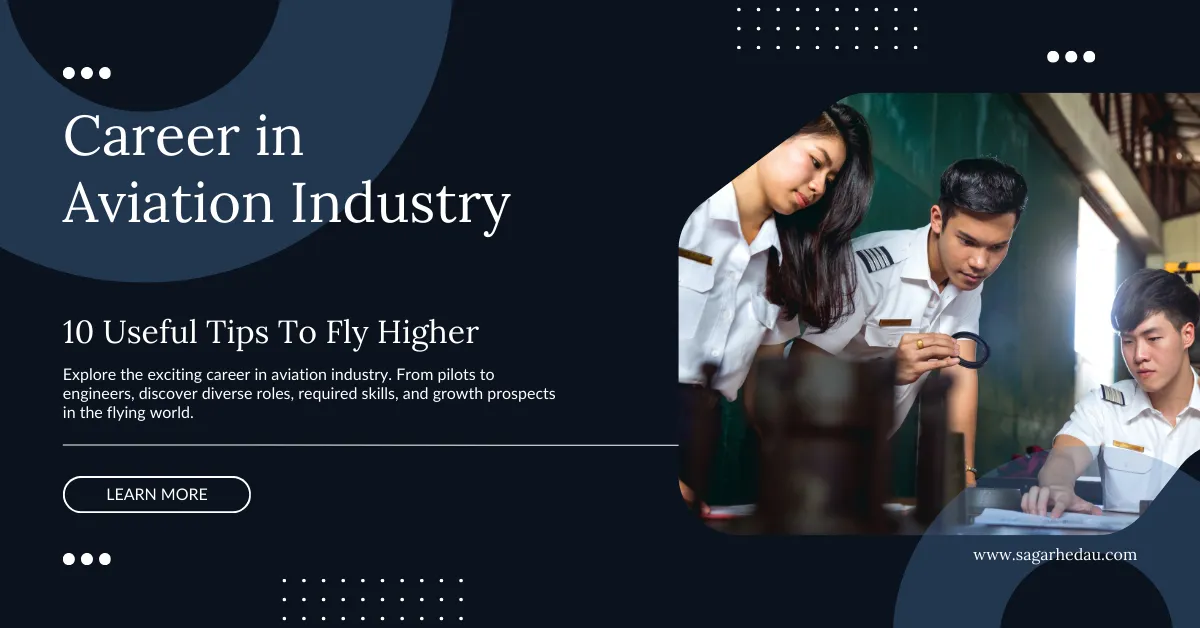A career in aviation industry offers exciting opportunities in a dynamic and growing field. The aviation sector encompasses a wide range of roles, from those directly involved in flight operations to support and management positions. As global air travel continues to expand, the demand for skilled professionals in various aviation careers is on the rise.
This blog will explore the diverse career paths available in the aviation industry, the requirements for entering these roles, and the prospects for those considering a career in this field. Whether you’re fascinated by aircraft, enjoy working with people, or have a passion for technology, the aviation industry might have the perfect career for you.
Types of Careers in Aviation Industry
A career in aviation industry offers diverse options. Pilots are the most visible, and responsible for operating aircraft safely.
- Air Traffic Controllers manage air traffic flow and ensure flight safety.
- Aircraft Mechanics maintain and repair aircraft to ensure airworthiness.
- Flight Attendants focus on passenger safety and comfort. Aerospace Engineers design and develop aircraft and related systems.
- Aviation Management professionals oversee various aspects of airline and airport operations.
Each of these careers in the aviation industry requires specific skills and training. Some roles, like pilots and air traffic controllers, are directly involved in flight operations, while others, such as engineers and managers, work behind the scenes to keep the industry running smoothly.
Education and Training Requirements
Pursuing a career in aviation industry typically requires specialized courses, education and training from good colleges. For pilots, this involves obtaining a commercial pilot’s license through flight schools or aviation academies.
- Air Traffic Controllers often need a bachelor’s degree and must complete an FAA-approved education program. Aircraft Mechanics usually attend FAA-certified aviation maintenance technician schools.
- Flight Attendants generally need a high school diploma and undergo extensive company-specific training.
- Aerospace Engineers typically require a bachelor’s degree in aerospace engineering or a related field.
- Aviation Management roles often require a degree in aviation management, business, or a related field.
Continuous training and certifications are common across all careers in the aviation industry to stay current with regulations and technologies.
Aviation Courses after 10th & 12th
| Name of the Course | Duration | Average Fees (INR) |
|---|---|---|
| Diploma in Airport Management | 1 year | INR 60,000 – 1,00,000 |
| Diploma in Ground Staff & Cabin Crew Training | 6 months/ 1 year | INR 35,000 – 1,20,000 |
| Student Pilot License | 1 year | INR 4,00,000 – 6,00,000 |
| Commercial Pilot Training | 4 to 5 years | INR 8,00,000 – 12,00,000 |
| Private Pilot License | 1 year | INR 10,00,000 -15,00,000 |
| Diploma in Aviation Hospitality and Travel Management | 1 year | INR 70,000 – 2,50,000 |
| Diploma in Airfare & Ticketing Management | 6 months – 1 year | INR 10,000 – 70,000 |
| BBA in Airport Management | 3 years | INR 70,000 – 1,50,000 |
| BBA in Aviation | 3 years | INR 90,000 – 2,00,000 |
| BSc in Airline And Airport Management | 3 years | INR 30,000 – 1,50,000 |
| Aircraft Maintenance Engineering (AME) | 3 years | INR 5,00,000 – 15,00,000 |
| MBA in Aviation Management | 2 years | INR 3,50,000 – 7,00,000 |
| MBA in Airline and Airport Management | 2 years | INR 2,20,000 – 6,00,000 |
| MSc in Aviation | 2 years | INR 50,000 – 1,50,000 |
Aviation Courses after Graduation
| Course | Institute | Fees |
|---|---|---|
| MBA in Aviation Management | UPES Dehradun | INR 13,34,000 |
| Jain University, Bangalore | INR 9,90,000 | |
| Galgotias University, Greater Noida | INR 1,49,000 | |
| Hindustan Business School, Bangalore | INR 2,00,000 | |
| MSc in Aviation | The Global Open University, Nagaland | INR 24,125 |
| Jawaharlal Nehru Technological University, Hyderabad | INR 5,80,000 |
Highest Paying Aviation Jobs
| Job Profile | Average Annual Salary |
|---|---|
| Flight Instructor | INR 9 – 10 lakhs |
| Terminal Manager | INR 9.5 lakhs |
| Aerospace Technician | INR 3 lakhs |
| Aircraft Mechanic | INR 4 lakhs |
| Pilot | INR 9 – 11 lakhs |
| Test Engineer | INR 4.5 lakhs |
| Airport Executive | INR 3 – 4 lakhs |
| Aeronautical Engineer | INR 4 lakhs |
| Avionics Engineer | INR 5 lakhs |
Skills Needed for Success
Success in a career in aviation industry requires a combination of technical and soft skills. Technical skills vary by role but often include understanding of aerodynamics, aircraft systems, navigation, and relevant software.
Soft skills are crucial across all aviation careers. These include excellent communication, teamwork, decision-making, and problem-solving abilities. Attention to detail is critical, as is the ability to remain calm under pressure.
For many roles, physical fitness and the ability to work irregular hours are important. Adaptability is key in the ever-evolving aviation industry. A passion for aviation and a commitment to safety are also valuable traits for anyone pursuing a career in this field.
Job Outlook and Salary Expectations
The job outlook for careers in aviation industry is generally positive, with growth expected in many sectors.
- Pilots, in particular, are in high demand due to increasing air travel and upcoming retirements. Salaries vary widely depending on the specific role and experience level.
- Pilots and Air Traffic Controllers tend to be among the highest-paid, with experienced professionals often earning six-figure salaries.
- Aircraft Mechanics and Flight Attendants typically earn middle-range salaries. Aerospace Engineers and Aviation Managers also command competitive salaries.
While entry-level positions may start lower, most careers in the aviation industry offer good potential for salary growth with experience and additional certifications.
Challenges in Aviation Careers
While rewarding, a career in aviation industry comes with its challenges. Many roles involve high-stress environments where quick, accurate decisions are crucial. Irregular work schedules, including nights, weekends, and holidays, are common in operational roles like pilots and flight attendants.
The industry is subject to strict regulations, requiring constant vigilance and adherence to safety protocols. Continuous learning is necessary to keep up with evolving technologies and procedures. Some careers, particularly those involving flight, can lead to extended periods away from home.
Despite these challenges, many find that the excitement and satisfaction of working in aviation outweigh the difficulties.
Advancement Opportunities
A career in aviation industry often offers clear paths for advancement. Pilots typically progress from regional airlines to major carriers, potentially becoming captains or moving into management roles.
Air Traffic Controllers can advance to supervisory positions or specialize in specific types of air traffic management.
Aircraft Mechanics may become lead mechanics or move into inspector roles. Flight Attendants can progress to senior or supervisory positions.
Aerospace Engineers might advance to lead complex projects or move into management.
In aviation management, professionals can climb the corporate ladder to executive positions. Many also find opportunities to specialize in areas like safety management, operations, or customer experience, further enhancing their career prospects in the aviation industry.
Impact of Technology on Aviation Careers
Technology is rapidly transforming careers in the aviation industry. Advancements in automation and AI are changing how aircraft are operated and maintained. This creates new job roles focused on managing and interpreting data from advanced systems.
Virtual and augmented reality are revolutionizing training methods across various aviation careers. The rise of drones is opening up new career paths in unmanned aerial vehicle operations and management.
Sustainability initiatives are driving the development of electric and hydrogen-powered aircraft, creating opportunities for specialists in these technologies. While some traditional roles may evolve, technology is also creating new and exciting career opportunities in the aviation industry.
How to Get Started in Aviation
To start a career in aviation industry, research different roles to find what interests you most. For many positions, begin by pursuing relevant education or training programs. Consider joining aviation clubs or organizations to network and gain exposure to the industry. Look for internship opportunities with airlines, airports, or aviation companies.
Entry-level positions can provide valuable experience and a foot in the door. Stay informed about industry trends and continue developing relevant skills. Be prepared for rigorous selection processes, including background checks and medical examinations for some roles. Remember, passion for aviation and a commitment to safety are highly valued in this field.
Conclusion
A career in aviation industry offers a unique blend of excitement, challenge, and opportunity. From the cockpit to the control tower, from the hangar to the boardroom, aviation careers cater to a wide range of interests and skills.
While the industry demands high standards and continuous learning, it rewards dedication with competitive salaries, clear advancement paths, and the satisfaction of being part of a crucial global industry.
As technology continues to evolve, new opportunities are emerging alongside traditional roles. For those with a passion for flight and a desire to be part of a dynamic field, a career in aviation industry can offer a fulfilling and rewarding professional journey.


